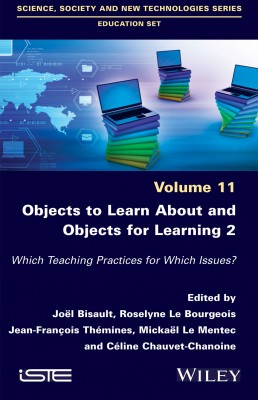
Edited by
Joël Bisault, University of Picardie Jules Verne, France
Roselyne Le Bourgeois, University of Picardie Jules Verne, France
Jean-François Thémines, University of Caen Normandy, France
Mickaël Le Mentec, University of Picardie Jules Verne, France
Céline Chauvet-Chanoine, University of Picardie Jules Verne, France
Resulting from a conference that took place in Amiens, France, in June 2019, this book examines the place and role of objects centered in teaching practices from kindergarten to university, both in the context of France and elsewhere. These “objects for learning” are considered in their physicality as productions, work or signs that are used for learning. They become “objects to learn about” when the object itself is the learning objective. This book offers a cross-disciplinary perspective, linking the different disciplinary fields studied and the many reference sources used by the authors.
This two-volume work offers an overview of current research on the subject, with this second volume focusing on objects in representations of space and time, then on learners’ activities in the making or use of objects, before concluding with different cultural and philosophical perspectives on objects.
Part 1. Objects and Representations of Space and Time.
1. The Map and the Game: Objects for Learning Geographical Points of Reference in Elementary School, Xavier Leroux.
2. The Didactic Use of Physical Objects in the Kindergarten School Calendar Ritual: A Case Study, Maria Moumoulidou.
3. The Map in the Core School, An Object for Learning, Sylvie Considére, Anne Glaudel, Maud Verherve and Mickaël Glaudel.
4. Professional Report: Using a Song as a Mediating Object for Learning Temporal Points of Reference, Christine Croset.
5. Professional Report: From Tangible Objects to Interactive Maps for Moving Around and Learning an Area – Two Examples with People with Visual Impairments, Quentin Chibaudel, Lachezar Dimitrov, Bernard Oriola, Christophe Jouffrais, Katerina Fibigerova and Valérie Tartas.
Part 2. Objects and Traces of the Activity.
6. From the Self-Evaluation Object to the Learning Subject, Sylvie Gruber Jost.
7. Creating a Sound Garden: Transforming Recycled Materials into Objects for Learning, John Didier, Marion Botella, Rachel Attanasio and Marie-Dominique Lambert.
8. The Experimental Protocol Poster in a “Preschool” Class: An Object for Learning or an Object to Learn About?, Corinne Marlot, Christine Riat and Patrick Roy.
9. Challenges in First-Years Schools: Early Manifestations of Executive Function, Irene Guevara, Iván Moreno-Llanos, Lucia Romero, Laura Zapardiel and Cintia Rodriguez.
Part 3. Points of View on Objects and Perspectives.
10. A Cultural Viewpoint about Objects: Objects that Narrate Cultures and Emotions, José Luis de los Reyes Leoz.
11. Four Researchers’ Points of View, Roselyne Le Bourgeois, Anne-Laure Le Guern, Mickaël Le Mentec, Jean-François Themines and Abdelkarim Zaid.
12. The Object Stance: Philosophical Perspectives, Alain Panero.
Joël Bisault is Emeritus Professor at the University of Picardie Jules Verne, France, and a member of the CAREF laboratory. His research focuses on science education in elementary school and on school objects.
Roselyne Le Bourgeois is an honorary lecturer at the University of Picardie Jules Verne, France, and a member of the CAREF laboratory. Her research focuses on the teaching of history in relation to other fields from kindergarten to the end of elementary school.
Jean-François Thémines is a Professor at the University of Caen Normandy, France, and a researcher at the ESO laboratory. His research focuses on didactic approaches to the teaching of geography in secondary and higher education as well as the geography of educational inequalities.
Mickaël Le Mentec is a lecturer at the University of Picardie Jules Verne, France, and a member of the CAREF laboratory. His research focuses on the socio educational uses of digital technologies.
Céline Chauvet-Chanoine is a school teacher and holds a doctorate in educational sciences from the CAREF laboratory of the University of Picardie Jules Verne, France. Her research focuses on science education in kindergarten, on school objects and on the professional identity of teachers.